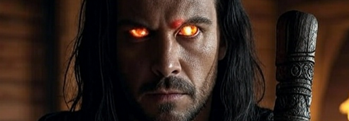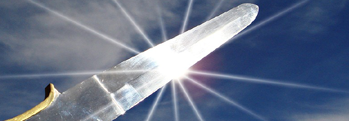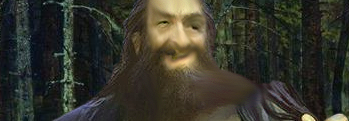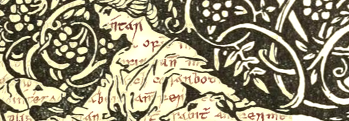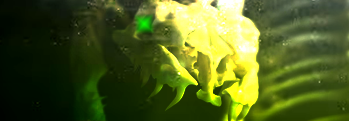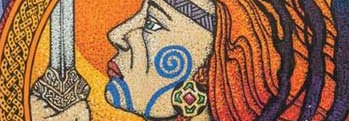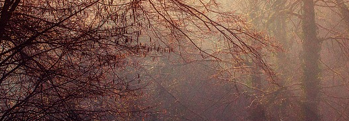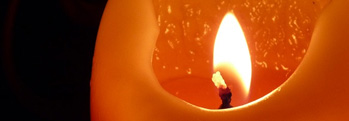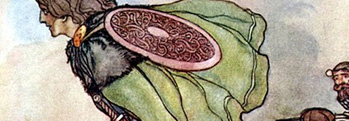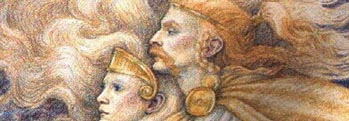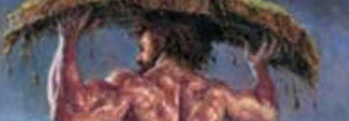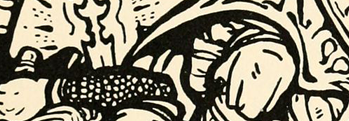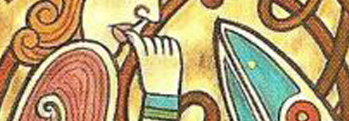Diarmuid and Grainne
Irish and Celtic myths and legends, Irish folklore and Irish fairy tales from the Fenian Cycle
The tragic legend of Diarmuid and Grainne
Diarmuid the Fair, son of Donn or Duibhne of the Tuatha De Danann was one of the Fianna, the great warriors of ancient Ireland who protected the land from dangers near and far. It was said that no woman could resist his gaze, for he'd been granted the blessing of comeliness by the Ghost Queen Morrigan after he helped her out of a spot of bother.
As well-regarded as he was among the men of the Fianna however, the time would come when he'd have to flee for his very life from their wrath and the vengeance of their master, Fionn Mac Cumhaill himself!
He had been raised with his half-brother, the son of a man named Roc. One day, the son of Roc was frightened by an animal and he ran between the legs of Diarmuid’s father Donn to hide, but Donn was a giant of a man and accidentally tread on the child, killing him.
When his father Roc found the child's body, he wept and raged but brought his son back to life in the body of a great wild boar, and said that Diarmuid would live no longer than the creature. He put a geas, a fate-working on the boar to someday kill Diarmuid, for he knew that Diarmuid had a geas never to pierce the skin of a pig, and so would be unable to defend himself.
In fear for Diarmuid's life, Donn fostered him out to Manannan mac Lir and Aengus Óg son of Dagda in the land of many colours and in the bay-indented coasts. He was also trained by the mighty warrior-woman Mongfinn. He grew to be a fair and handsome man, and in time joined the doughty band of the Fianna.
After many years and many adventures, it came to pass that an uneasiness grew between Fionn, the leader of the Fianna, and Cormac Mac Airt, the High King of all Ireland who ruled from his seat at Tara. Although Fionn was by now an old man, Cormac was becoming wary of the power he held and his popularity, which was starting to rival his own!
 This was a matter of sadness for Fionn, for he was always true to his word and loyal in his deeds, although he knew it was the way of kings, so he hit upon an idea to mend their friendship, and proposed that he should marry Gráinne the daughter of Cormac, gaining for himself trust and a beautiful young wife in the process. Cormac was delighted to hear of it as a future rival then became a son-in-law.
This was a matter of sadness for Fionn, for he was always true to his word and loyal in his deeds, although he knew it was the way of kings, so he hit upon an idea to mend their friendship, and proposed that he should marry Gráinne the daughter of Cormac, gaining for himself trust and a beautiful young wife in the process. Cormac was delighted to hear of it as a future rival then became a son-in-law.
The only person who wasn't happy with the arrangement was Gráinne, who thought Fionn too old for her tastes! But her father would hear none of it and so the marriage was organised.
Tara readied itself for the event with a great feast and a full month of celebrations, there were jugglers and musicians, and poets and druids workings wonders, tables creaking under delicious dishes prepared by masters from around the world, and much more besides. People came from all parts of Ireland to attend and show their respects, but little did they know the surprise that was in store for them!
On the night of the high feast when Fionn and Gráinne were to be wed, she sat at the head of the table next to him, pale of face and set of lip as himself and his men made merry, drinking rich mead and laughing.
Gráinne watched all that passed and asked for her father's Druid, Dara. Seeing how fair was Oisín son of Fionn she wondered that Fionn hadn't desired she marry him instead. Wise old Dara told her that Oisín would never dare go against his father's will.
“And then who,” she asked with a blush across her cheeks, “is that fine young man sat over by the fire?”
“That is Diarmuid O'Donn,” said Dara, “of the fair countenance, who is the best lover of women and maidens in all of the land of Ireland.”
Gráinne was smitten and felt love for him stir in her heart, so she stole away to her bower where she mixed various herbs into a thick potion, filling half the guest-cup with it and half with dark wine to hide the look and smell of it.
She passed her chalice to all the chiefs of the Fianna, to her father and his men, and last to the servants who brought the food, and each one that took a drop presently sank down into a deep, lasting sleep.
As silence stole over the hall she came to Diarmuid and said to him that he should be hers, but as he was loyal to Fionn he refused on the spot, although in truth he felt an answering call in himself. Not to be easily dissuaded, she cast upon him a powerful geas that he must bring her away from that place.
He struggled against it and complained, but to no avail, until sorrowfully he asked how they might escape the strong place that was Tara.
“Come to my rooms,” she said, “for I have a wicker-gate in a secret corner that we can get through.”
“Aha!” cried Diarmuid, “I am under geas never to pass a wicker gate!” For it was normal then for men to have many geases, the better to avoid harm and bend fate to their will.
“Well you must find a way then,” she proclaimed, so he took his yellow-shafted spear Crann Buidhe of great length and flex and bid her climb on his back. When she had done so he bent the spear and they bounded straight over the walls of Tara in one single leap!
They ran with great haste until Diarmuid said he was tired and could go no further, and with each step he begged Gráinne to return. “It is certain that I will not go back,” says Gráinne, “nor part from you till death part us.”
“Then you shall walk the distance,” he said, depositing her from his back.
“There is no need,” said she, "for I have a horse and chariot not far from here." And so they escaped across the Ath Luan of the river Shannon.
When Fionn awoke the next morning his rage was unbounded, and he roused the Fianna to give chase and hunt the couple down.
They fugitives met with Aengus Óg, who was much inclined to matters of love and thoroughly approved of their match, and he decided to help them. He warned them that they were never going to be able to sleep in a cave with one opening, or a house with one door, or a tree with one branch, and that they would never be able to eat where they cooked, or sleep where they ate. They would have to keep moving if they were to stay ahead of Fionn and the Fianna.
Days of pursuit became weeks and months, and those months turned into years, but still Fionn's wrath didn't cool. Often they heard the baying of his hounds behind them, but Diarmuid either by his own craft or that of his foster father Aengus managed to evade capture.
On every night they rested, and Diarmuid left behind a piece of fish or bread for Fionn, as a sign that he hadn't joined with Gráinne in love, until one day the two were wading through a ford and she mocked his manhood, pointing to where water had splashed up between her legs.
“See now, brave man of the Fianna,” she cried, “even the water is bolder than you!” And so they coupled and Diarmuid left no more messages for Fionn, which needless to say did little to calm him down. Very close he came to catching them more than once – Diarmuid had to leap over the warriors and up a sheer cliff using his yellow spear, and on another occasion they hid high in the branches of the Quicken-Tree of Dubhros.
With hounds baying at the foot of the tree, men of the Fianna climbed up, but Aengus made them look like Diarmuid and threw them down, allowing the real Diarmuid and Gráinne to escape in the confused fighting.
 The next year, Diarmuid met and befriended a fierce one eyed giant called Searbhán who agreed to let him to hunt on his land, provided he did not eat any of the magical rowan berries that grew on a solitary tree. But Gráinne, who was now pregnant, felt a great hunger for the berries, and so Diarmuid challenged the giant for her. Searbhán's skill at magic protected him from Diarmuid's mortal weapons, but Diarmuid eventually triumphed by turning the giant's iron club against him, and killed him stone dead.
The next year, Diarmuid met and befriended a fierce one eyed giant called Searbhán who agreed to let him to hunt on his land, provided he did not eat any of the magical rowan berries that grew on a solitary tree. But Gráinne, who was now pregnant, felt a great hunger for the berries, and so Diarmuid challenged the giant for her. Searbhán's skill at magic protected him from Diarmuid's mortal weapons, but Diarmuid eventually triumphed by turning the giant's iron club against him, and killed him stone dead.
Sweet indeed were those berries, but sweeter yet were the ones on high, so they climbed to eat their fill and rested for a while.
They didn't know that the Mac Morna clan, long foemen of Fionn, had decided to make their peace with him. Well Fionn while not in the best of moods said that he would take their peace if they brought him either the head of Diarmuid O’Donn, or the sweet and magical berries of the rowan tree. They decided the berries would be easier to get, so they set out, but of course, they found the giant slain and many of the berries missing.
Well Fionn was no fool and he knew that only Diarmuid could have killed that giant, since it wasn’t one of his men, so himself and the Fianna spent that night camping under the tree.
Fionn had a notion that Diarmuid was still up there and he challenged Oisín to a game of fidchell. As Oisín began to make a move that would lead to his defeat, a berry dropped onto the square that he should move to. He made that move instead, and continued to follow the guidance of the rowan berries. Eventually, Oisín beat his father at fidchell for the very first time.
Fionn sprang up, crying “There’s only one man in Ireland who could have beaten me at fidchell, and that’s Diarmuid O’Donn!” But before his men could scale the tree Diarmuid leaped down and bounded away on his spear, while Aengus hid Gráinne in his magical cloak of invisibility.
On the chase went for years, and many times did the Fianna come close to catching them but never once did they succeed. This is why throughout the length and breadth of Ireland there are many places called Leaba Diarmuid ’s Gráinne, or the Bed of Diarmuid and Gráinne.
Aengus Óg came to Fionn seven times to ask would he give up the chase, and seven times he was refused, until on the eighth Aengus spoke to Cormac the High King as well, who was tired of the endless pursuit, and moved him to plead on Gráinne's behalf with Fionn.
Well they used to say of Fionn that his sense of justice was so sure and so unbreakable that if he had to give judgement in a quarrel between a stranger and his own son, he would be as fair to the stranger as to his son - and as fair to his son as to the stranger. It was told of him that he was so generous that if the leaves falling from the trees in autumn were gold and the foam on the salt sea waves was silver, Finn would give it all away to any who asked him.
It was told of him also that he had another side, a dark-of-the-moon side, and could forgive an injury, laughing, but knew also how to nurse an old hate through the years, to the death of the man he hated.
And so Fionn reluctantly agreed to give up his chase and cool his anger, but in his heart still he nursed a silent darkness.
Diarmuid and Gráinne were allowed to settle down on land that belonged to Donn in Keshcorran, County Sligo and Fionn even relented enough to give Diarmuid a gift of land as was fitting to a hero who had served him well in the past. So all went well with them for many years until they had four sons.
Then one dark night Diarmuid was awoken by the sound of a hound baying on the wind, and a fearsome sound it was to him, giving him the ice-sweats and trembling. He made as if to go to investigate but Gráinne threw her arms about him and held him back, telling him it was but the work of the underfolk.
 He subsided but twice more that night the baying of hounds awoke him, and he settled that he must go to investigate, taking with him the yellow spear Crann Buidhe that had served him so well in his elopement. Gráinne begged him to take instead the Gai dearg, the red spear for she knew it to be more powerful, but he refused.
He subsided but twice more that night the baying of hounds awoke him, and he settled that he must go to investigate, taking with him the yellow spear Crann Buidhe that had served him so well in his elopement. Gráinne begged him to take instead the Gai dearg, the red spear for she knew it to be more powerful, but he refused.
High on the windswept slopes of Ben Bulben he climbed, and at that time they were well-cloaked in heavy forest and bushes, and who did he meet but Fionn Mac Cumhaill under the wan moonlight!
“Is it to kill me that you've come, Fionn?" asked Diarmuid narrowly but Fionn looked at him as though he was mad and told him that they'd come seeking a lost hound of the Fianna, and that he should be nowhere near the moutain this night, for there was a powerful wild boar loose as well. Knowing Diarmuid's geas, Fionn told him that he'd best be off, perhaps in his heart suspecting that this prick to his pride and hint of cowardice would be enough to tie him to his fate.
And sure enough, Diarmuid refused to leave, saying he'd never flee from a pig. Fionn shrugged and moved off, and before long a great crashing and grunting erputed from nearby. It was the boar itself, and Diarmuid knew it to be the very same son of Roc that had been restored all those years ago. With a cry of despair he hurled his yellow spear at it and slew the beast, but it snarled and ran him through with its tusks all the same, and Diarmuid lay dying.
Hearing the racket Fionn and his men came to the spot and found him gasping on the ground. Knowing well that Fionn had the power of healing in his hands, Diarmuid begged him to get a handful of water and make his wounds right.
Grim Fionn stood over him, the darkness stirring in his heart, and said “It likes me well to see you in that plight, Diarmuid. I would that all the women in Ireland saw you now for your excellent beauty is turned to ugliness and your choice form to deformity.”
Diarmuid begged of him and reminded him of the adventures they'd had together, and all the times he'd saved Fionn's life, and all it would take in payment would be a handful of water from the well.
“But there is no well,” said Fionn.
“That is not true,” said Diarmuid, "only nine paces from you is the best well of pure water in the world.”
Oscar son of Fionn and the rest of the Fianna began to grow wroth at this and entreated with Fionn to heal Diarmuid, so he went to the well and filled his hands. As he turned so turned the worm of jealousy and anger in him, and he let the water trickle from his hands as he walked back.
Again he went to the well, but again his heart rebelled, until at last, stung by the memories of Diarmuid's friendship, he filled his hands a third time and returned in earnest, only to find Diarmuid had died.
Gráinne, hearing the battle-sound from afar, burst into the clearing and her howls of grief echoed to the heavens and the halls of the Sidhe below, and Fionn and his men left her to it.
Aengus appeared like the wind and said, “There has never been a night since I took you with me to Brú na Boinne before your first year had passed that I didn't watch over you, until last night. And alas for the treachery of Fionn, despite the peace between you!
He brought the body back with him to the Brú and said that though he could not restore the dead to life, "I will send a soul into him so that he may talk with me each day."
And that was the end of Diarmuid the Fair.
Below on the map can be found the place where he died near Ben Bulben.
More Legends from the Fenian Cycle
Mongán mac Fíachnai was a prince of the Gaels, none other than he whose father was Fíachnae mac Báetáin, and it was about the seventh century in Ireland when he ruled over Ulster. Many are the tales told of him and his royal reign, with some even whispering that he was the son of Manannán mac Lir, ancient G ... [more]
The Corleck stone head is believed to be an ancient pagan idol, representing perhaps some ancestor or deity from the pre-Christian era in Ireland. The most striking aspect of the Corleck stone head is its three faces, set in strange, almost unsettling expressions, all the more remarkable for their simplicity of design, lacking ears or detailed feat ... [more]
The Clonoura shield was discovered standing upright in a bog in Clonoura, county Tipperary and represents one of the very few fully intact Iron Age shields that have ever been found. It is marked with many slash and stab scars from knives, swords, spears and other sharp weapons, and dates from 30 to 60 AD, pre-Christian Iron Age Ireland. It is q ... [more]
The days of the heroes of the Fianna have captured the imaginations of many throughout the ages, and one such was the ninth century poet Gofraidh Fionn O’Dalaigh, one of the finest poets in all of Killarney and all of Ireland. For it was his pen and none other that first put quill and ink to parchment and recorded the old story of Reicne F ... [more]
It was a fine day in Ireland many years ago when Fionn and his Fianna took a fancy to go out hunting. Warm was the sun amid the whispering glades of ancient forests, gentle was the breeze and sweet the scent of summer flowers in its bosom. Sweeter yet was the sight of a mighty deer to the eyes of the hunters, and so they gave chase, howling with de ... [more]
It was in the days of Fionn and the Fianna, a very long time ago in Ireland, that the people of Ben Edair decided to hold a festival, a Feis or Aonach, to celebrate the season. All of Fionn’s hosts were gathered, the seven ordinary warbands and the seven extraordinary warbands, and they danced and played music merrily with the people. Then ... [more]
There are few these days who have not heard of Fionn Mac Cumhaill, hero and defender of Ireland, or at least might recognise his name. But there were no creatures that Fionn loved amongst his three hundred dogs more than his two favourites, Bran and Sceolan, meaning Raven and Survivor, and though it’s a stranger story than most, this is the t ... [more]
It is not unusual for stories in the Irish legendarium to have more than one meaning besides that of a literal recounting of historical events, whether by accident or by design. Some tales were meant to be understood in the context of the era and culture of the story teller, while others might instruct in certain arts, and yet others contain myster ... [more]
Those monks who recorded the mythologies and folklore of Ireland which had previously been passed down by word of mouth from bard to druid to bard for countless generations were, by their very nature, devout Christians. As Christians they were dedicated to not only God and His Church, but to the people who bore and nurtured them, and everywhere the ... [more]
One day Fionn Mac Cumhaill, doughty hero of Ireland, and his friends Goll, Cialta and Oscar, as well as others of the Fianna, were resting after the hunt on a certain long hill now known by a different name. Their meal was being made ready, when what should happen only a girl of the kin of the giants came striding up and sat down among them, a grea ... [more]
Something which often appears in the most ancient tales of Ireland is the grisly vision of heads which speak after being separated from their bodies! This was said to be an art of the druids inherited from the necromancy of the Dé Danann, who were themselves said to be able to raise a whole army from the grave to fight again day after day! ... [more]
There once was a young fellow called Conall, and he lived with his parents in the east of the country. They lived a quiet life, catching fish and digging up oysters for meat and lamps, but one dark day the Fomors came and demanded tribute. Having none to give, his father bid the sea demons begone, but instead they made to take himself and his famil ... [more]
Young Fionn Mac Cumhaill was out walking with his dog Bran one fine morning, and he happened to pass into a deep and thick dark wood of the kind that once covered all of Ireland, for the hunting was better there, when what did he come across but a thousand horses hauling timber and men chopping down the trees and preparing the logs. "What a ... [more]
There was a mighty warrior in the west of Eriu, and Cumhal Mac Art was his name. Feared was his axe and he could skewer two men with a single cast of his feathered war-dart, and yet for all that he lived a lonely life, and a life of fear – for it had been foretold that should he ever marry, he would die in battle the very next day! But all ... [more]
It was in the day of Fionn Mac Cumhaill when he was an old man, yet still hale and hearty, that one of his warriors, whose name was Diarmaid son of Donn and grandson of Duibne, had carried off his young bride-to-be, Gráinne daughter of Cormac! The two had fallen in love and Gráinne, for all of Fionn's fame, wanted nothing to do wi ... [more]
One warm summer's day Fionn and his men were out hunting through the darkling forests of Ballachgowan in Munster, chasing deer and boar through the gloomy glades, when they stopped short all of a sudden and came face to face with a startling sight! For what had stepped between them and their prey but a strange, damp giant of a man. Black wer ... [more]
Fionn Mac Cumhaill stood at the door of his hunting lodge with his fists on his hips, his heart sinking as he realised his intentions to hunt for deer this day were lost in the waves of mist and fog that had rolled in from Dublin bay, although at that time it was known by a different name. It had come as far inland as Gleann na Smol, the Glen of th ... [more]
When Fionn Mac Cumhaill became leader of the Fianna, the fiercest and most warlike of those bands of heroes who lived in the wild places, hunting and acting as champions for their kings, and defending Ireland from evil, he decided that he wished to have only the best warriors to follow him. So he sat down and sucked his thumb to taste the wisdom ... [more]
Close by where Limerick city stands today lie the ruins of an ancient and once mighty fortress called Carrigogunnel, which commanded all the lands about with a stern hand. It was known then as a place of ill omen, and it is known today as the same, for it was once the home of an uncanny hag by the name of Gráinne. Amid the surrounding mar ... [more]
A dark horde of fell-handed warriors approached Ireland, sails gathered off the coast like storm clouds, billowing out in the gusts of uncertain wind, while oars bent to the rolling thunder of drums. Fierce indeed was the host of King Colgan, master of Lochlainn, and he came to make war on Cormac Mac Airt, High King of Ireland! As soon as Fionn ... [more]
Diarmuid the Fair, son of Donn or Duibhne of the Tuatha De Danann was one of the Fianna, the great warriors of ancient Ireland who protected the land from dangers near and far. It was said that no woman could resist his gaze, for he'd been granted the blessing of comeliness by the Ghost Queen Morrigan after he helped her out of a spot of bother ... [more]
Fionn Mac Cumhaill and the rest of the Fianna were resting after a great battle, weary and sore with sorrow at the loss of their fellows, when they spied coming along the shores of Loch Lein in County Kerry a beautiful young woman riding a swift horse, so swift indeed that its hooves scarcely seemed to touch the ground! Now although the women of ... [more]
Now it is known by some that the fairies of Ireland weren't much like the fairies we hear about in these latter days, harmless things of mischief and frolic, but were instead respected and often feared, for their anger was quick and their kindness was whimsical. Some would join men in battle, and some would make war on men, others were omens of ... [more]
It was a fine brisk spring morning in Ireland when Fionn Mac Cumhaill decided to take himself for a stroll along the white sandy beaches of the seashore, the better to breathe the air and enjoy the simple pleasures life had to offer. But that morning, life had more to offer and it didn't look pleasant, for it was a giant bearing down on the bea ... [more]
Fionn MacCumhaill was well known as a fair and handsome man, but his most distinguishing feature was his grey hair - and he was not born with it! Fionn was one time out on the green of Almhuin, and he saw what had the appearance of a grey fawn running across the plain. He called and whistled to his hounds then, but neither hound nor man heard hi ... [more]
After his seven years of training with the poet Finegas were done, Fionn Mac Cumhaill took himself from the river Boyne to the great hall of the High King in Tara, Conn of the Hundred Battles, to present himself there as a member of the Fianna, the very best of the best warriors throughout Ireland. Announcing himself, Conn took him into the band an ... [more]
Here is the story of how Fionn MacCumhaill gained the knowledge of the world. And wouldn't it be a great thing to know it all? Still, knowledge and wisdom must be balanced, and this was known to the young man called Fionn, which means fair and bright. He was fleeing from the warriors who had murdered his father when he came upon the hiding plac ... [more]




